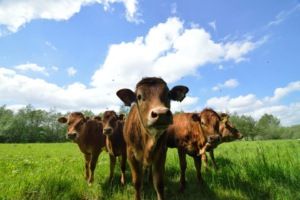News
New grass to reduce cow-burping methane emissions
This article is more than 9 years old.
Cow burps account for 40 percent of the Danish agriculture sector’s emission of greenhouse gases

Burps the culprit, not farts (photo: Environment and Food Ministry)
Danish researchers from Aarhus University have developed a new type of grass that looks to impact greenhouse gas levels emitted by the agriculture sector.
The new grass is easier for the cows to digest and thus cuts down on the amount of methane gas the bovine beasts release through burping. The Environment and Food Ministry has allocated 13.5 million kroner for further research.
“We know that cattle is one of agriculture’s sinners when it comes to releasing climate gases, so it’s important that we research how we can reduce the cows’ emissions,” Esben Lund Larsen, the environment and food minister, told DR Nyheder.
READ MORE: Oregano to make cow burps more climate friendly
Better milk, brighter future
Larsen went on to praise the new grass for also increasing the cows’ production of milk.
The researchers have implemented modern DNA technology for the project, and expectations are high. The new ‘super grass’ is expected to be ready in about seven to eight years.
Cow burps are about 25 times more potent than CO2 and account for 40 percent of the Danish agriculture sector’s emission of greenhouse gases. It’s a common misconception that the cow methane impacting the climate negatively stems from farts.










































